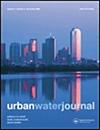Water regulation ecosystem service facing cities growth. Evaluation of the effects of an urbanization scenario in an intermediate city, Argentina
IF 1.6
3区 环境科学与生态学
Q3 WATER RESOURCES
引用次数: 0
Abstract
ABSTRACTThis work aims to evaluate the water regulation ecosystem service in a peri-urban sector of Bahía Blanca, an intermediate city of Argentina. Variations in the level of provision are analyzed within the framework of an urbanization scenario. For this purpose, we used the tool ‘Retention of excess precipitation by vegetation cover’, included in the ECOSER protocol, which is based on the Curve Number method.Future urbanization in Bahía Blanca peri-urban area would decrease the level of provision of the water regulation ecosystem service between 0.5 and 2.5%. The best response in rainfall retention was observed for the shrubland land cover. Likewise, the provision level of the ecosystem service decreases regarding the Antecedent Runoff Conditions and the amount of rainfall. This study contributes to generating knowledge to understand the dynamics of a particularly important ecosystem service in cities, given its direct relationship with stormwater management.KEYWORDS: Ecosystem Serviceswater regulationurban Planningperi-urbanstormwater managementArgentina Disclosure statementNo potential conflict of interest was reported by the author(s).Data availability statementNon-digital data supporting this study are curated at Universidad Nacional del Sur, ArgentinaAdditional informationFundingThis study was funded by the research project ‘“Physical Geography Applied to the study of the interaction between society and nature. Environmental problems at various tempo-spatial scales”’ (Grant number 24/G092) subsidized by the General Secretary of Science and Technology of the Universidad Nacional del Sur.面向城市发展的水调节生态系统服务。对阿根廷一个中等城市城市化情景影响的评估
摘要本研究旨在评估阿根廷中部城市Bahía布兰卡城郊区域的水调节生态系统服务。在城市化情景的框架内分析了供应水平的变化。为此,我们使用了ECOSER协议中包含的基于曲线数方法的“植被覆盖保留过量降水”工具。Bahía布兰卡近郊地区未来的城市化将使水调节生态系统服务的提供水平降低0.5 - 2.5%。灌丛覆盖对降雨保持的响应效果最好。同样,生态系统服务的供给水平随着径流条件和降雨量的变化而降低。鉴于城市生态系统服务与雨水管理的直接关系,这项研究有助于了解城市生态系统服务的动态变化。关键词:生态系统服务、水资源调控、城市规划、城郊雨水管理、阿根廷披露声明作者未报告潜在利益冲突。数据可用性声明支持本研究的非数字数据由阿根廷国立南方大学整理。附加信息本研究由“自然地理学在社会与自然相互作用研究中的应用”研究项目资助。不同时空尺度的环境问题”(批准号24/G092),由南方国立大学科学和技术秘书长资助。
本文章由计算机程序翻译,如有差异,请以英文原文为准。
求助全文
约1分钟内获得全文
求助全文
来源期刊

Urban Water Journal
WATER RESOURCES-
CiteScore
4.40
自引率
11.10%
发文量
101
审稿时长
3 months
期刊介绍:
Urban Water Journal provides a forum for the research and professional communities dealing with water systems in the urban environment, directly contributing to the furtherance of sustainable development. Particular emphasis is placed on the analysis of interrelationships and interactions between the individual water systems, urban water bodies and the wider environment. The Journal encourages the adoption of an integrated approach, and system''s thinking to solve the numerous problems associated with sustainable urban water management.
Urban Water Journal focuses on the water-related infrastructure in the city: namely potable water supply, treatment and distribution; wastewater collection, treatment and management, and environmental return; storm drainage and urban flood management. Specific topics of interest include:
network design, optimisation, management, operation and rehabilitation;
novel treatment processes for water and wastewater, resource recovery, treatment plant design and optimisation as well as treatment plants as part of the integrated urban water system;
demand management and water efficiency, water recycling and source control;
stormwater management, urban flood risk quantification and management;
monitoring, utilisation and management of urban water bodies including groundwater;
water-sensitive planning and design (including analysis of interactions of the urban water cycle with city planning and green infrastructure);
resilience of the urban water system, long term scenarios to manage uncertainty, system stress testing;
data needs, smart metering and sensors, advanced data analytics for knowledge discovery, quantification and management of uncertainty, smart technologies for urban water systems;
decision-support and informatic tools;...
 求助内容:
求助内容: 应助结果提醒方式:
应助结果提醒方式:


